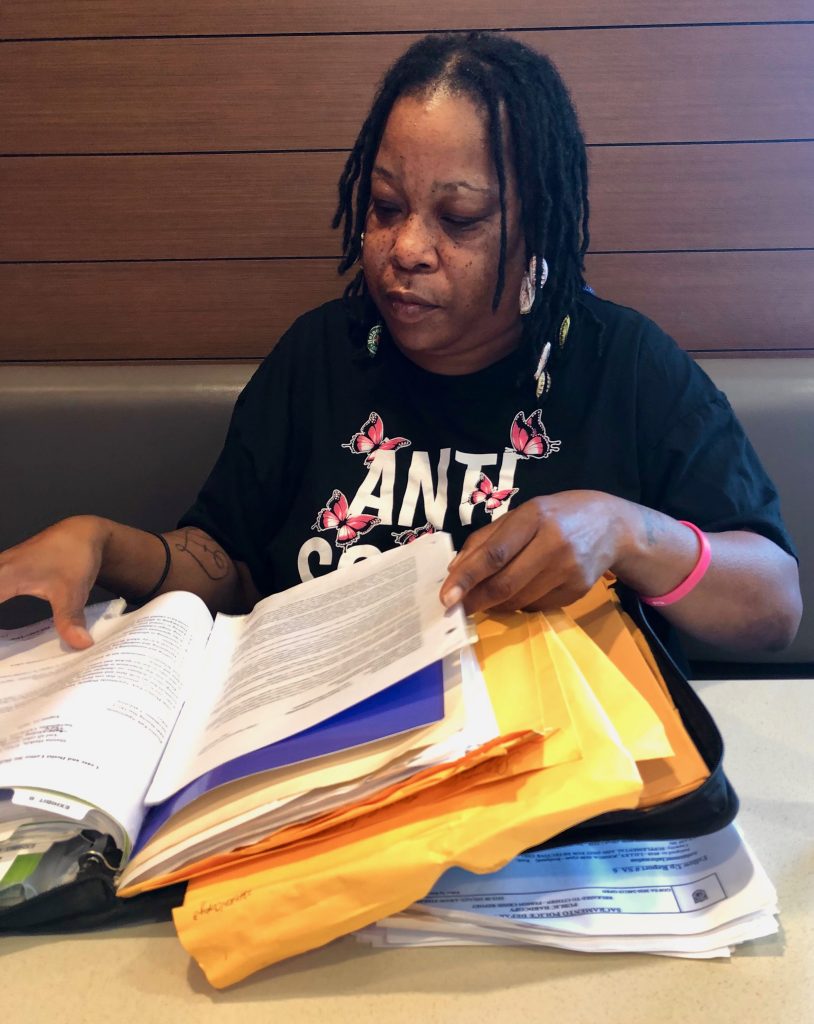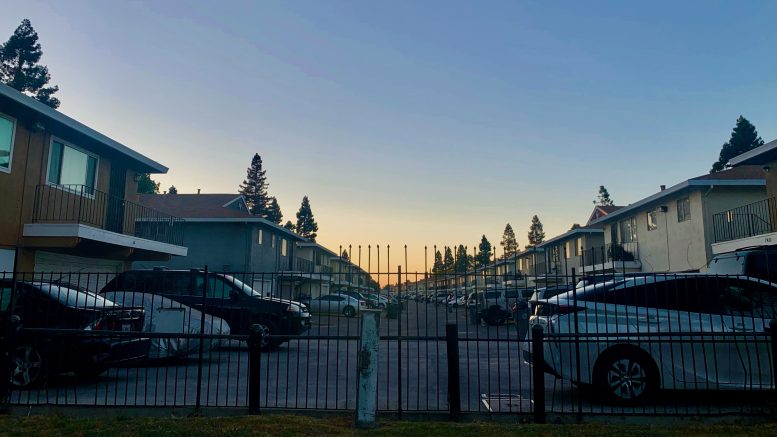By Marie Hoffman
Sacramento is ranked as one of the most diverse cities in the U.S., but the outsized impact of the housing crisis on Black citizens tracks closely – and unsettlingly – with national rates.
According to the National Alliance to End Homelessness, Black Americans “represent 13% of the general population but account for 37% of people experiencing homelessness and more than 49% of homeless families with children.” Sacramento County’s latest Point in Time Count for homelessness in the area revealed that Black citizens make up 31% of the current local homeless population, and 11% of the general population.
City leaders are aware of equity issues and the risks of displacement due to gentrification, having recognized both in their 2021-2029 Housing Element Plan. But critics argue that displacement patterns due to other factors, including harassment fueled by discrimination, are often left out of the conversation and play a larger role in the region’s rise in homelessness than local leaders are acknowledging. Housing advocates worry this creates a gap in understanding among both the public and local leaders of where specific patterns exists.
The pattern demonstrated in the following stories raise questions on that front – and how alleged cases of discrimination impact housing stability.
Profiling the victim

Sheena Haskins’ problems with the management at Phoenix Park Apartment Complex in South Sacramento started five months before the eviction notice appeared taped to her door on August 20, 2020. Haskins’ family of four – herself and three sons, at the time aged 19, 12, and 9 – had been living in the apartment since 2018. They reportedly had no incidents or problems until April 1, 2020 when Haskins received the first in a series of minor lease violations, which she describes as “untrue and unproven.”
According to a description provided to Sheena by Phoenix Park management, “On April 1, 2020, at approximately 11:56 a.m., four males were observed loitering in the parking area. Two of those men were seen entering your unit.”
Haskins attempted to set the record straight with management that same day: “The four individuals were my son, Ti’Von Briggs, and the other three were my nephews. They were helping Ti’Von with bags and groceries out of the car and one nephew came in to use the restroom and shortly after [they] left.”
Haskins believes one person in the lease office was responsible for the sudden string of supposed violations. She says once that person no longer worked there, the violation notices stopped.
At one point, Haskins received the three-day notice and provided Phoenix Park management with a cease-and desist-letter for defamation of character. The letter responded item by item to each of the supposed lease violations, and the most recent and shocking claim: that her 19-year-old disabled son Ti’Von was involved in gang activity. The complex named a specific gang from a different neighborhood, and said that his presence “put the entire community at risk for their safety.” Two days before the notice appeared on her door, Ti’Von had been shot twice while on a late-night walk to meet up with his female friend to get some snacks at the store. The property managers at Phoenix Park, the John Stewart Company, reacted to the shooting by evicting the family.
Ti’Von was clearly the victim of a crime, likely a random victim. His first and only contact with the Sacramento Police Department was when officers showed up and rendered aid until the ambulance arrived to take him to the hospital.
“Even the detective told me his record was squeaky clean” Haskins recalls. “[The detectives] also said even if they had something on him, they wouldn’t talk about an open investigation to Phoenix Park.”
She added, “[Phoenix Park] saw an African-American young man and made assumptions about him that aren’t true.”
Back in elementary school, Ti’Von received a diagnosis of Attention Deficit Hyperactivity Disorder and a learning comprehension disorder. He was in special education classes until getting out of high school. At the time of the shooting, his mother was helping him navigate early adulthood, including employment opportunities. Haskins describes him as a homebody who likes video games. Now 22, Ti’Von has Post Traumatic Stress Disorder and has been living with his relatives. He eventually received compensation from the California Victim Compensation Board related to the shooting.
Haskins works over forty hours a week, and, as of early June, was sleeping in her car. Her two younger boys, now 15 and 12, stay with family in a different town a few hours away. Haskins sees them two to three times a year. When asked what she missed most about having her family together, she answers, “food…movies…just normal things like having fun together. holidays.”
Being followed

In September of 2022, Roeshonda Davis says her neighbor at Phoenix Park Apartments started harassing her. The neighbor had been involved in a physical altercation with a group of women offsite from the complex. When the neighbor learned that one of the women involved was a friend of Davis’s sister, the harassment started with stares and dirty looks, which Davis ignored.
“I was trying to keep the peace, and just focus on taking care of my son,” Davis says, referring to her then four-year-old son Mal’achi, who has autism. “I was not involved with what happened before. It was just guilt by association.”
Because of a shared a walkway, Davis could not avoid the hostile neighbor altogether. Then, on September 11t and 15, 2022, two incidents took place that made Davis feel that she needed to do more to protect her son. On the 11, the confrontational neighbor was yelling threats at Davis from a second story balcony with what appeared to be a firearm in her sweater. At least two other residents witnessed the incident.
On the morning of September 15, the neighbor followed Davis to her car, again yelling threats. Davis says she rushed to strap her son into his seat and drive him to school. A letter from his pre-school autism specialist states that he was brought to school “distraught” and that his “being upset escalated into extreme behaviors requiring us to call his mother to pick him up.”
“My son hasn’t been exposed to yelling or a hostile environment like that,” Davis explains, “so he had a big reaction to it.”
Shaken, Davis filed a police report and approached the complex management to see if she could move to a different part of the complex, away from the neighbor. She says management told her they wouldn’t let her because it would cost them money.
Davis acknowledges that Phoenix Park conducted an investigation into the conflict, including calling two witnesses who confirmed that the incident with the firearm. However, at the end of the investigation, Davis says that Phoenix Park treated her and the neighbor the same – both as criminals – and both were evicted.
The 60 Day Notice Terminating Tenancy ordered Davis to move out by December 7, 2022. Among the reasons cited were: Criminal or wrongful activity, and Harassment – items that Davis felt should not be on her rental history.
The run-around

Despite the frustration of feeling that she had been unfairly punished with eviction for trying to protect her son, Davis’ move out went fairly smooth. She received some of her deposit back and got her housing choice voucher from Sacramento Housing and Redevelopment Agency, with which she could look for her next apartment. In the meantime, Davis temporarily moved in with her mother.
But in March, Phoenix Park gave the mother a bad reference when she tried to apply for a new apartment. Davis says that the property managers at the complex she was applying at told her Phoenix Park was claiming she owed money, which didn’t make sense.
“They are so disorganized over there,” says Davis. “Why would they give me money back on my deposit if I owed them money?”
Phone calls and office visits from Davis and her grandmother to Phoenix Park led to the proverbial run-around, with onsite managers pointing the fingers at headquarters, the John Stewart Company. As a result of the bad reference, Davis missed the opportunity to move into the new apartment.
This same circumstance resembles a critical turning point in how Haskins’ family became homeless.
With Ti’Von recovering in the hospital, and a 6th and 4th grader to look after, Haskins couldn’t find a new apartment and move within three days. She contacted Legal Services of Northern California, or LSNC, to figure out her options. With LSNC in an advisory role, Haskins and Phoenix Park reached an agreement that gave the family extra time to find a new place and avoided an eviction being on Haskins’ record.
Haskins did find an apartment, but it all fell apart when she says when Phoenix Park gave her a bad reference. She was shocked: “We were all ready to go, packed up and everything.”
Now the family couldn’t leave and their move out date was delayed even further.
In Davis’ case, it appears the bad reference was the result of an error. The next time she applied for an apartment, she received a good reference from Phoenix Park and has now moved in. But even so, whether by error – or by a genuine belief that they feel was influenced by racial bias – the bad reference that each woman received had real consequences for the families. Davis was between apartments for eight months. Haskins was locked out and separated from her kids for two years and four months.
Black and disabled citizens versus the system

While Ti’Von and Mal’achi’s disabilities were not a factor in their families’ evictions, being disabled puts them in another category of citizens that often suffer chronic homelessness. According to the 2022 Sacramento County Point in Time Count for homelessness, an estimated 4,314 individuals with a disabling condition are experiencing prolonged periods of homelessness in the region. Fifty-eight percent of unsheltered adults indicated that they struggled with one or more disabilities that impaired their ability to secure employment or housing.
Mal’achi experienced his first and hopefully last eviction before his fifth birthday. Davis described his emotional struggle after the sudden move. In the weeks that followed, he would point and yell at their old complex as they drove by, asking if they could go home. Diagnosed with autism at 19-months-old, Mal’achi graduated from early interventions and has worked with specialists ever since. His recent placement in a school with a highly regarded autism program was welcome news for the family.
Sacramento News and Review spoke to a third Black mother whose eviction from Phoenix Park in 2021 followed a similar pattern. Disabled with Multiple Sclerosis, her health condition made it difficult to coordinate the review of her documents, or confirm some details. SNR decided not to identify her by name for the purposes of this article, but a witness confirmed the woman’s story, backing up her claims that – after her teenage daughter was stabbed by a neighbor in a fight – she was forced by Phoenix Park to leave.
“I signed the paper that said we had to go,” the woman said. “We just had to go.”
She is now staying with family.
Policies that might offer some protection to renters in such confounding circumstances are being considered by both the City and County at the moment: Most recently, on April 4, 2023, the City Council’s Law and Legislation Committee discussed a proposal by District 5 Councilmember Caity Maple that would call for the City to adopt a ‘Tenant Anti-Harassment Ordinance,’ similar to the cities of Oakland and Richmond.
The committee intends to revisit the issue after their staff gathers more information regarding where the “gaps” in tenant protections can be found. Under this instruction, discrimination would not likely be identified as a gap in current tenant protections because it is and has been illegal. Housing advocates say that the data collected in the Point in Time count proves that, despite its illegality, discrimination in housing continues to have a significant local impact on homeless numbers.
Oakland’s Tenant Anti-Harassment Ordinance specifically reinforces that tenants’ civil rights shall not be violated, and provides tenants with legal recourse if they are harassed by a property owner. Their website states that the ordinance is meant to deter such harassment.
From Sacramento city councilmember Maple’s Rationale for the recommendation: “While many federal and state laws exist making these activities illegal, tenants experience significant barriers in asserting their rights in Sacramento. Community legal services are overwhelmed, there are very few local private attorneys specializing in these areas, and more often than not, our lowest-income residents are most impacted and unable to fight for their rights.”
Advocates say the process to even get on the phone with Legal Services of Northern California is competitive. Tenants are advised to call first thing in the morning on a specific day of the week, or they won’t be able to reach anyone. And even then, LSNC is likely to serve in an advisory role only. They cannot offer full scope representation to everyone, because they are so flooded with requests.
Haskins situation illustrates the limitations of this critical, but overextended service. She knew her rights, but her paper trail shows her attempts to challenge Phoenix Park after LSNC’s involvement ended turned into a drawn-out eviction process with cascading financial consequences.
Failed Inspections and Unrefunded Deposits

A letter from Haskins dated Sept. 10, 2021 to Phoenix Park and John Stewart Company asserts that, as of that date, they had kept her entire deposit without giving her an itemized statement of the charges – long past the 21 days required by law. Denied the opportunity to be present for the move out walkthrough, Phoenix Park also charged Haskins over $1,000 out of pocket for damage that she says was not her fault but due to long-standing issues with the building.
Photographs Haskins took of her unit before moving out show prominent horizontal, vertical and diagonal cracks across the walls, wide gaps along the seams of the walls and ceiling in some places, as well as mold. She has two notifications from the Sacramento Housing and Redevelopment Agency dated October 2020 and January 2021 confirming that her unit had failed inspection: “The Housing Authority is abating (stopping) the Housing Assistance Payment (HAP) for this unit for failure to meet Housing Quality Standards effective 01/01/2021.”
SHRA is the local entity responsible for ensuring ongoing development of affordable housing and administering the federal Housing Choice Voucher program.
Exhausted from the previous months of trauma, Haskins paid the additional charges on a unit that she knew had failed inspection. At that point, she felt pressured to do whatever she needed to do until her family could be safely relocated. And yet, even after paying for the dubious damages, she still received the negative reference that resulted in her becoming homeless.
Haskins applied for over a dozen apartments in different neighborhoods, spending money on application fees for both her and Ti’Von, who must be on the application as an adult. Although she was approved by multiple prospective landlords, she kept getting denied by SHRA because she fell just short of the minimum income requirements for the zip codes. Finally, two years and four months after she left Phoenix Park, she secured a new apartment and was approved to move in late June.
Haskins has not had any luck finding a lawyer in Sacramento. The injury of being separated from her family and without a home of her own for over two years following these confounding events has many possible legal approaches, but as with all legal matters, it is complicated and there are statutes of limitations that may come into play depending on the legal theory any hypothetical counsel would choose to apply.
The John Stewart Company did not respond to comment or interview requests for this story, including question about Haskins, Davis or the third woman’s story.
Haskins’ new apartment does provide relief, but she is still upset that everything happened with Phoenix Park the way it did.
“My son is not a gang member,” she stresses. “They owe me my money back. None of this should have happened.”


The website of the John Stewart Company has some interesting information about the businesses they are in, leading to information indicative of of shady behavior: https://www2.dre.ca.gov/hearingfiles/H12580SF_220505_P.pdf
My hypothesis is that since the death a few years ago of the eponymous founder, the company culture has gone downhill.